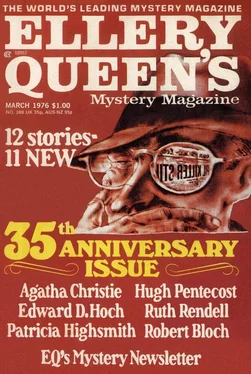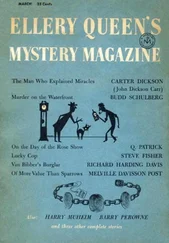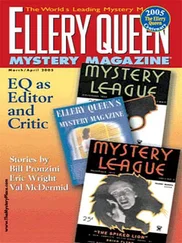Аврам Дэвидсон - Ellery Queen’s Mystery Magazine. Vol. 67, No. 3. Whole No. 388, March 1976
Здесь есть возможность читать онлайн «Аврам Дэвидсон - Ellery Queen’s Mystery Magazine. Vol. 67, No. 3. Whole No. 388, March 1976» весь текст электронной книги совершенно бесплатно (целиком полную версию без сокращений). В некоторых случаях можно слушать аудио, скачать через торрент в формате fb2 и присутствует краткое содержание. Город: New York, Год выпуска: 1976, Издательство: Davis Publications, Жанр: Детектив, на английском языке. Описание произведения, (предисловие) а так же отзывы посетителей доступны на портале библиотеки ЛибКат.
- Название:Ellery Queen’s Mystery Magazine. Vol. 67, No. 3. Whole No. 388, March 1976
- Автор:
- Издательство:Davis Publications
- Жанр:
- Год:1976
- Город:New York
- ISBN:нет данных
- Рейтинг книги:5 / 5. Голосов: 1
-
Избранное:Добавить в избранное
- Отзывы:
-
Ваша оценка:
- 100
- 1
- 2
- 3
- 4
- 5
Ellery Queen’s Mystery Magazine. Vol. 67, No. 3. Whole No. 388, March 1976: краткое содержание, описание и аннотация
Предлагаем к чтению аннотацию, описание, краткое содержание или предисловие (зависит от того, что написал сам автор книги «Ellery Queen’s Mystery Magazine. Vol. 67, No. 3. Whole No. 388, March 1976»). Если вы не нашли необходимую информацию о книге — напишите в комментариях, мы постараемся отыскать её.
Ellery Queen’s Mystery Magazine. Vol. 67, No. 3. Whole No. 388, March 1976 — читать онлайн бесплатно полную книгу (весь текст) целиком
Ниже представлен текст книги, разбитый по страницам. Система сохранения места последней прочитанной страницы, позволяет с удобством читать онлайн бесплатно книгу «Ellery Queen’s Mystery Magazine. Vol. 67, No. 3. Whole No. 388, March 1976», без необходимости каждый раз заново искать на чём Вы остановились. Поставьте закладку, и сможете в любой момент перейти на страницу, на которой закончили чтение.
Интервал:
Закладка:
As he neared the farmhouse, he was surprised to see a black government staff car pulled in off the road. In this collective, made up entirely of former government employees, one rarely was visited by the bureaucracy. He entered the kitchen door with just a bit of apprehension, to find Lara conversing with two men in overcoats who gave the impression of having just arrived.
Taz knew one of them — Colonel Tunic, a grizzled old man who’d been his immediate superior during the Cold War days. The other, a younger official who carried himself with an air of newly acquired authority, was a stranger to him.
“Comrade Taz!” Tunic greeted him, throwing out both arms in an affectionate bear hug. “You look well. Retirement must agree with you.”
“Lara says farm work is bad on my legs. How are things back in Moscow?”
“Good, good.” He gave a rueful smile. “Détente, you know.” Remembering the other man, he turned to introduce him. “Comrade Taz, this is Stepan Vronsky, a specialist in international matters.”
The two men shook hands, and Taz wondered what Vronsky’s true function was. He wondered especially what had brought these men out here to see him. “You look cold,” he told them. “Take off your coats and have some vodka.”
“I could never live in the country,” Stepan Vronsky said. “The wind is so cold!”
Taz smiled. “One becomes used to it. Lara, bring us some glasses, will you?”
When they were seated around the rough oak kitchen table, which Lara had thoughtfully covered with a piece of flowered oilcloth, Colonel Tunic said, “We miss you in Moscow. You retired too soon.”
Taz merely shrugged. “Cipher experts of my sort have been replaced by machines. Diplomats and machines.”
“Sometimes there is still need for one,” Vronsky said. Taz turned to study his face and saw only the pale reflection of the Russian winter with its sunless days.
“We miss you,” Colonel Tunic repeated. “And now we need you. The government wishes you to come out of retirement for one final assignment to the west.”
The words fell like thunder on Taz’s ears. He’d been expecting it, certainly, ever since he saw the long black car pulled up before his house. But to hear it now was still a shock. “What sort of assignment?” he asked quietly.
“Some material must be taken to Switzerland. It’s in your line — microdots.”
Taz snorted. “A diplomatic courier could get it through for you, as you well know.”
“That’s only part of it. There’s something else.” Tunic shifted in his chair. “An old friend of yours is involved.”
“Who would that be?”
“Remember Jeffery Rand, the head of Britain’s Double-C?”
“Of course.”
Vronsky spoke again. “You should welcome an opportunity to confront an old enemy one more time.”
“Rand is not my enemy,” Taz replied. “We were two professional men doing our jobs.”
“Nevertheless, he is on the other side.”
“Yes,” Taz admitted. “Just what do you have in mind?”
“You are familiar with the Nobel Prize recipient, Kolia Komarov?”
“Certainly.” Despite nominal press censorship, almost everyone in the Soviet Union must have been aware of the Komarov case. A powerful novelist in the tradition of Turgenev, his choice as the Nobel laureate last fall had stirred up all the old fires in Russian literary circles. Though Komarov had written harshly of past Soviet governments, the men in the Kremlin did not want another Pasternak or Solzhenitsyn case on their hands. They had allowed Komarov to leave Moscow to accept the award in Stockholm. In his acceptance speech he announced to the startled world his defection from Russia.
“Then you know he’s living in Switzerland now. And you also know he was forced to leave several of his manuscripts behind when he fled.”
“Yes.”
“Komarov still has a great many friends here. Recently his wife — who fled with him to Switzerland — contacted a cousin. Arrangements were made to smuggle his manuscripts out of the country. The cousin, a loyal Party member, came to us.” Vronsky smiled slightly, proud of his accomplishment. “Specifically, to me.”
“I see.” Taz took a sip of his vodka. “And where do I fit in?”
Colonel Tunic took over the story. Despite the difference in their ages and bearing, Tunic and Vronsky might have been partners in a traveling comedy act. Taz thought about this and chuckled inwardly. He wondered why he had never laughed at Tunic during all their years together in Moscow.
“The manuscript material has been reduced to microdots,” Tunic said. “With your experience in the field, and especially your experience with Rand, you are the natural choice to deliver it.”
“Rand would hardly believe I was performing an act contrary to Soviet policy. He knows I am loyal. And you have not yet told me how Rand figures in all this.”
“Rand will be involved when you get him involved. You make contact with him and arrange a meeting in Geneva. He’ll come, of course. You explain that you have always been a great admirer of Kolia Komarov’s writing, and for this reason you have smuggled his manuscript out of Russia, in microdot form. You ask Rand’s help in getting you through the guards to visit Komarov. He does so, the microdots prove to be useless, and the British are discredited in Komarov’s eyes.”
“A trick,” Vronsky chortled. “A hoax!” The thought seemed to please him.
“Is this the way we wage war now?” Taz asked distastefully.
“We wage it any way we can.”
“You don’t need me for it,” Taz decided with a wave of his hand, as if chasing away a pesky fly.
“We need you for Rand.”
“And why do you need Rand? He is not the British government. He is not even British Intelligence. He is only one man, like myself.”
Colonel Tunic shifted uneasily. “There is more to it, Comrade. We cannot tell you everything at this point, but you must trust us.”
Lara came back into the kitchen. Taz saw her eyes catch his, but he couldn’t read the message there. Perhaps it was only a reflection of his own misgivings.
With the coming of winter London had settled beneath a dreary mantle of mist, reminding Rand of his annual promise to move to the south of France. This morning especially was one of low dark clouds that blotted out the sun. From his wide window overlooking the muddy Thames he could see only the bare outlines of the city — the new high-rise apartments, the dome of St. Paul’s that was Christopher Wren’s supreme achievement. Everything else was a somber gray blur.
He was halfway through the morning’s routine of reports and mail when Parkinson entered. “We’ve got something unusual here, sir.”
“On the Syrian matter?”
“No, it’s a message we intercepted in the old cipher the Russians used when Taz was in charge. I haven’t seen it in years.”
“Odd.”
“Odder still, the message seems addressed to you.”
Rand took the sheet of lined intercept paper that Parkinson held out. Rand, it read, you may see your old friend from Paris at the Hotel de Ville in Geneva on Monday next.
“What do you make of it, sir?”
“I don’t quite know.” The message had been sent by a route that Taz must have known the British would intercept.
But Taz was in retirement.
Or was he?
Later that day Rand phoned Hastings and told him he would be out of the country for a couple of days the following week. There was a matter in Geneva that needed checking into.
He’d always found Geneva to be a beautiful city, situated as it was at the point where the Rhone River exited from its brief journey across Lake Leman. There were lovely little parks running along both sides of the river at the point of exit, with jetties leaping out from either shore and beacons to guide the traveler.
Читать дальшеИнтервал:
Закладка:
Похожие книги на «Ellery Queen’s Mystery Magazine. Vol. 67, No. 3. Whole No. 388, March 1976»
Представляем Вашему вниманию похожие книги на «Ellery Queen’s Mystery Magazine. Vol. 67, No. 3. Whole No. 388, March 1976» списком для выбора. Мы отобрали схожую по названию и смыслу литературу в надежде предоставить читателям больше вариантов отыскать новые, интересные, ещё непрочитанные произведения.
Обсуждение, отзывы о книге «Ellery Queen’s Mystery Magazine. Vol. 67, No. 3. Whole No. 388, March 1976» и просто собственные мнения читателей. Оставьте ваши комментарии, напишите, что Вы думаете о произведении, его смысле или главных героях. Укажите что конкретно понравилось, а что нет, и почему Вы так считаете.












